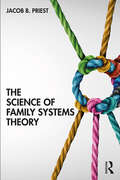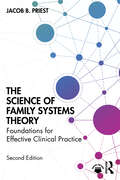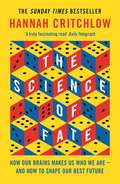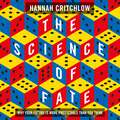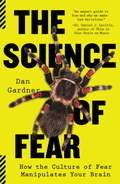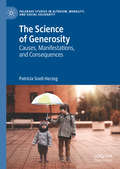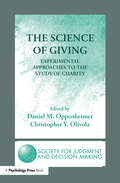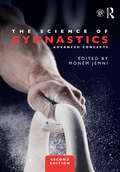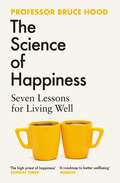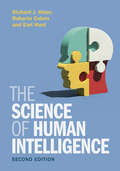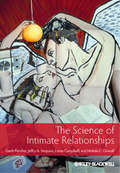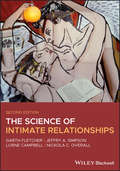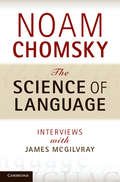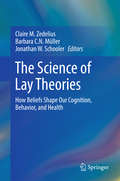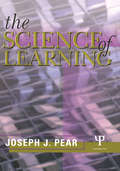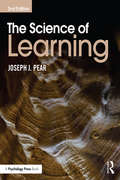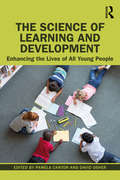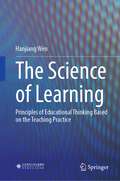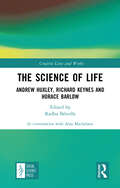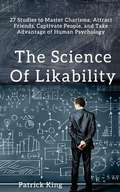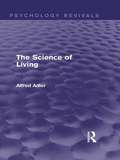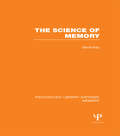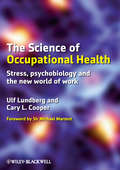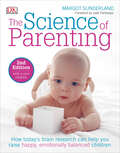- Table View
- List View
The Science of Family Systems Theory
by Jacob PriestThis accessible text examines how the science of autonomy and adaptation informs all family therapy approaches and discusses how clinicians can use this science to improve their practice. Uniquely focussing on how to integrate science as well as theory into clinical practice, the book provides an overview of science from multiple domains and ties it to family systems theory through the key framework of autonomy and adaptation. Drawing on research from genetics, physiology, emotion regulation, attachment, and triangulation, chapters demonstrate how a comprehensive science-informed theory of family systems can be applied to a range of problematic family patterns. The text also explores self-of-the-therapist work and considers how autonomy and attachment are connected to systems of power, privilege, and oppression. Supported throughout by practical case examples, as well as questions for consideration, chapter summaries, and resource lists to further engage the reader, The Science of Family Systems Theory is an essential textbook for marriage and family therapy students as well as mental health professionals working with families.
The Science of Family Systems Theory: Foundations for Effective Clinical Practice
by Jacob B. PriestThis fully updated, accessible text examines how the science of autonomy and adaptation informs all family therapy approaches and discusses how clinicians can use this science to improve their practice. Focusing on how to integrate science as well as theory into clinical practice, the book provides an overview of science from multiple domains and ties it to family systems theory through the key framework of autonomy and adaptation. Drawing on research from genetics, physiology, emotion regulation, attachment, and triangulation, chapters demonstrate how a comprehensive science-informed theory of family systems can be applied to a range of problematic family patterns. The text also explores self-of-the-therapist work and considers how autonomy and attachment are connected to systems of power, privilege, and oppression. New to this edition are two chapters on common presenting problems in family therapy and how they can be understood through a family systems lens, as well as discussion questions and added online instructor materials.Supported throughout by practical case examples, as well as questions for consideration, chapter summaries, and resource lists to further engage the reader, The Science of Family Systems Theory is an essential textbook for marriage and family therapy students as well as mental health professionals working with families.
The Science of Fate: The New Science of Who We Are - And How to Shape our Best Future
by Hannah Critchlow**THE SUNDAY TIMES BESTSELLER**'A truly fascinating - if unnerving - read'DAILY TELEGRAPH'Acute, mind-opening, highly accessible - this book doesn't just explain how our lives might pan out, it helps us live better'BETTANY HUGHES'A humane and highly readable account of the neuroscience that underpins our ideas of free will and fate'PROFESSOR DAVID RUNCIMAN***So many of us believe that we are free to shape our own destiny. But what if free will doesn't exist? What if our lives are largely predetermined, hardwired in our brains - and our choices over what we eat, who we fall in love with, even what we believe are not real choices at all? Neuroscience is challenging everything we think we know about ourselves, revealing how we make decisions and form our own reality, unaware of the role of our unconscious minds. Did you know, for example, that:* You can carry anxieties and phobias across generations of your family?* Your genes and pleasure and reward receptors in your brain will determine how much you eat?* We can sniff out ideal partners with genes that give our offspring the best chance of survival?Leading neuroscientist Hannah Critchlow draws vividly from everyday life and other experts in their field to show the extraordinary potential, as well as dangers, which come with being able to predict our likely futures - and looking at how we can alter what's in store for us. Lucid, illuminating, awe-inspiring The Science of Fate revolutionises our understanding of who we are - and empowers us to help shape a better future for ourselves and the wider world.
The Science of Fate: The New Science of Who We Are - And How to Shape our Best Future
by Hannah CritchlowThe Sunday Times Top Ten Bestseller'A truly fascinating - if unnerving - read'The Telegraph'We can all benefit from Critchlow's book'New Scientist'Acute, mind-opening, highly accessible - this book doesn't just explain how our lives might pan out, it helps us live better'Bettany Hughes'A humane and highly readable account of the neuroscience that underpins our ideas of free will and fate'Professor David RuncimanSo many of us believe that we are free to shape our own destiny. But what if free will doesn't exist? What if our lives are largely predetermined, hardwired in our brains - and our choices over what we eat, who we fall in love with, even what we believe are not real choices at all? Neuroscience is challenging everything we think we know about ourselves, revealing how we make decisions and form our own reality, unaware of the role of our unconscious minds. Did you know, for example, that:* You can carry anxieties and phobias across generations of your family?* Your genes and pleasure and reward receptors in your brain will determine how much you eat?* We can sniff out ideal partners with genes that give our offspring the best chance of survival?Leading neuroscientist Hannah Critchlow draws vividly from everyday life and other experts in their field to show the extraordinary potential, as well as dangers, which come with being able to predict our likely futures - and looking at how we can alter what's in store for us. Lucid, illuminating, awe-inspiring The Science of Fate revolutionises our understanding of who we are - and empowers us to help shape a better future for ourselves and the wider world.
The Science of Fate: The New Science of Who We Are - And How to Shape our Best Future
by Hannah CritchlowAre we really the masters of our own destiny? Neuroscientist Hannah Critchlow shows how far our future is already hardwired in our brains. Like Sapiens and Thinking Fast and Slow, The Science of Fate revolutionises the way we understand our species and ourselves.So many of us believe that we are free to shape our own destiny. But what if free will doesn't exist? What if our lives are largely predetermined, hardwired in our brains - and our choices over what we eat, who we fall in love with, even what we believe are not real choices at all? Neuroscience is challenging everything we think we know about ourselves, revealing how we make decisions and form our own reality, unaware of the role of our unconscious minds. Did you know, for example, that:* You can carry anxieties and phobias across generations of your family?* Your genes and pleasure and reward receptors in your brain will determine how much you eat?* We can sniff out ideal partners with genes that give our offspring the best chance of survival?Leading neuroscientist Hannah Critchlow draws vividly from everyday life and other experts in their field to show the extraordinary potential, as well as dangers, which come with being able to predict our likely futures - and looking at how we can alter what's in store for us. Lucid, illuminating, awe-inspiring The Science of Fate revolutionises our understanding of who we are - and empowers us to help shape a better future for ourselves and the wider world.(P)2019 Hodder & Stoughton Limited
The Science of Fear: How the Culture of Fear Manipulates Your Brain
by Daniel GardnerAn essential guide to the hardwiring that frightens and confuses us every dayFrom terror attacks to bursting real estate bubbles, from crystal meth epidemics to online sexual predators and poisonous toys from China, our list of fears seems to be exploding. Yet we are the safest and healthiest humans in history. Why are we so worried?The Science of Fear is an introduction to the new brain science of risk, dissecting the fears that misguide and manipulate us every day. Award-winning journalist Daniel Gardner demonstrates how irrational fear springs from the ways humans miscalculate risks based on our hunter-gatherer brains. With the exclusive cooperation of risk-science pioneer Paul Slovic and other leading experts, Gardner reveals how our "gut" reactions lead us astray. Understanding our irrational fears frees us from political and corporate manipulation, and makes our choices better. Ultimately, The Science of Fear will make you brave."Excellent... Analyzes everything from the media's predilection for irrational scare stories to the cynical use of fear by politicians... [A] cheery corrective to modern paranoia. -The Economist "Elegantly weaves academic research and everyday experience... An excellent book." -Dan Ariely, author of Predictably Irrational "A terrific book, full of wonderful insights, and offering cutting-edge social science in a reader-friendly package. The life you save may be your own!" -Cass Sunstein, coauthor of NudgeFrom the Trade Paperback edition.
The Science of Generosity: Causes, Manifestations, and Consequences (Palgrave Studies in Altruism, Morality, and Social Solidarity)
by Patricia Snell HerzogThis book advances understanding of the manifestations, causes, and consequences of generosity. Synthesizing the findings of the 14 research projects conducted by the Science of Generosity Initiative and offering an appendix of methods for studying generosity, this comprehensive account integrates insights from disparate disciplines to facilitate a broader understanding of giving—ultimately creating a compendium of not only the latest research in the field of altruistic behaviors, but also a research roadmap for the future. As the author sequentially explores the manifestations, causes, and consequences of generosity, Patricia Snell Herzog here also offers analyses ranging from the micro- to macro-level to paint a full picture of the individual, interpersonal and familial, and collective (inter)actions involved in altruism and generosity. The author concludes with a call to stimulate further interdisciplinary generosity studies, describing the implications for emerging scholars and practitioners across sociology, economics, political science, religious studies, and beyond.
The Science of Giving: Experimental Approaches to the Study of Charity (The Society for Judgment and Decision Making Series)
by Daniel M. OppenheimerAmericans donate over 300 billion dollars a year to charity, but the psychological factors that govern whether to give, and how much to give, are still not well understood. Our understanding of charitable giving is based primarily upon the intuitions of fundraisers or correlational data which cannot establish causal relationships. By contrast, the chapters in this book study charity using experimental methods in which the variables of interest are experimentally manipulated. As a result, it becomes possible to identify the causal factors that underlie giving, and to design effective intervention programs that can help increase the likelihood and amount that people contribute to a cause. For charitable organizations, this book examines the efficacy of fundraising strategies commonly used by nonprofits and makes concrete recommendations about how to make capital campaigns more efficient and effective. Moreover, a number of novel factors that influence giving are identified and explored, opening the door to exciting new avenues in fundraising. For researchers, this book breaks novel theoretical ground in our understanding of how charitable decisions are made. While the chapters focus on applications to charity, the emotional, social, and cognitive mechanisms explored herein all have more general implications for the study of psychology and behavioral economics. This book highlights some of the most intriguing, surprising, and enlightening experimental studies on the topic of donation behavior, opening up exciting pathways to cross-cutting the divide between theory and practice.
The Science of Gymnastics: Advanced Concepts
by Monèm JemniThe Science of Gymnastics provides the most comprehensive and accessible introduction available to the fundamental physiological, biomechanical and psychological principles underpinning performance in artistic gymnastics. The second edition introduces three new sections: applied coaching, motor learning and injury prevention and safety, and features contributions from leading international sport scientists and gymnastics coaches and instructors. With case studies and review questions included in each chapter, the book examines every key aspect of gymnastic training and performance, including: physiological assessment diet and nutrition energetics kinetics and kinematics spatial orientation and motor control career transitions mental skills training and perception injury assessment and prevention, with clinical cases advanced case studies in rotations, vault approach and elastic technologies in gymnastics. A fully dedicated website provides a complete set of lecture material, including ready-to-use animated slides related to each chapter, and the answers to all review questions in the book. The book represents an important link between scientific theory and performance. As such, The Science of Gymnastics is essential reading for any student, researcher or coach with an interest in gymnastics, and useful applied reading for any student of sport science or sports coaching.
The Science of Happiness: Seven Lessons for Living Well
by Bruce Hood&‘Do yourself a favour and grab this fantastic guide! Explains practical strategies for getting out of our own heads and finding more connection, presence, and joy&’ LAURIE SANTOS, Professor of Psychology at Yale University and host of The Happiness Lab podcast _______________________________________________________________________We all want to be happier, but our brains often get in the way. When we&’re too stuck in our heads we obsess over our inadequacies, compare ourselves with others and fail to see the good in our lives.In The Science of Happiness, world-leading psychologist and happiness expert Bruce Hood demonstrates that the key to happiness is not self-care but connection. He presents seven simple but life-changing lessons to break negative thought patterns and re-connect with the things that really matter. Alter Your Ego Avoid Isolation Reject Negative Comparisons Become More Optimistic Control Your Attention Connect With Others Get Out of Your Own Head Grounded in decades of studies in neuroscience and developmental psychology, this book tells a radical new story about the roots of wellbeing and the obstacles that lie in our path. With clear, practical takeaways throughout, Professor Hood demonstrates how we can all harness the findings of this science to re-wire our thinking and transform our lives. _______________________________________________________________________&‘The Science of Happiness is a rare bird – a book that is grounded in the best new science, written with wit and wisdom, and provides clear and valuable lessons for living your best life. Highly recommended!&’ DANIEL GILBERT, author of the New York Times bestseller Stumbling on Happiness&‘This is a wonderful guide to what actually makes people happier – full of wisdom backed by a wealth of scientific evidence. If you want practical ideas that you can use right now to boost your wellbeing, this is your book&’ ROBERT WALDINGER, author of The Good Life: Lessons from the World's Longest Study on Happiness&‘The most erudite, thoughtful, and original take on this important subject I have ever encountered. I learned something new in every chapter, and as a bonus it&’s a page-turning read' MICHAEL SHERMER, author of Why People Believe Weird Things
The Science of Human Intelligence
by Earl Hunt Richard J. Haier Roberto ColomIn this revised and updated edition of Hunt's classic textbook, Human Intelligence, two research experts explain how key scientific studies have revealed exciting information about what intelligence is, where it comes from, why there are individual differences, and what the prospects are for enhancing it. The topics are chosen based on the weight of evidence, allowing readers to evaluate what ideas and theories the data support. Topics include IQ testing, mental processes, brain imaging, genetics, population differences, sex, aging, and likely prospects for enhancing intelligence based on current scientific evidence. Readers will confront ethical issues raised by research data and learn how scientists pursue answers to basic and socially relevant questions about why intelligence is important in everyday life. Many of the answers will be surprising and stimulate readers to think constructively about their own views.
The Science of Intimate Relationships
by Lorne Campbell Jeffry A. Simpson Garth Fletcher Nickola OverallThe Science of Intimate Relationships represents the first interdisciplinary approach to the latest scientific findings relating to human sexual relationships.Offers an unusual degree of integration across topics, which include intimate relationships in terms of both mind and body; bonding from infancy to adulthood; selecting mates; love; communication and interaction; sex; passion; relationship dissolution; and moreSummarizes the links among human nature, culture, and intimate relationshipsPresents and integrates the latest findings in the fields of social psychology, evolutionary psychology, human sexuality, neuroscience and biology, developmental psychology, anthropology, and clinical psychology.Authored by four leading experts in the fieldInstructor materials are available at www.wiley.com/go/fletcher
The Science of Intimate Relationships
by Lorne Campbell Jeffry A. Simpson Garth J. Fletcher Nickola C. OverallProvides a unique interdisciplinary approach to the science of intimate human relationships This newly updated edition of a popular text is the first to present a full-blooded interdisciplinary and theoretically coherent approach to the latest scientific findings relating to human sexual relationships. Written by recognized leaders in the field in a style that is rigorous yet accessible, it looks beyond the core knowledge in social and evolutionary psychology to incorporate material and perspectives from cognitive science (including brain-imaging studies), developmental psychology, anthropology, comparative psychology, clinical psychology, genetic research, sociology, and biology. Written by an international team of acclaimed experts in the field, The Science of Intimate Relationships offers a wealth of thought-provoking ideas and insights into the science behind the initiation, maintenance, and termination of romantic relationships. The 2nd Edition features two new chapters on health and relationships, and friends and family, both of which shed new light on the complex links among human nature, culture, and romantic love. It covers key topics such as mate selection, attachment theory, love, communication, sex, relationship dissolution, violence, mind-reading, and the relationship brain. Provides a coherent and theoretically integrative approach to the subject of intimate relationships Offers an interdisciplinary perspective that looks beyond social and evolutionary psychology to many other scientific fields of study Includes two new chapters on ‘Relationships and Health’ and ‘Friends and Family’, added in response to feedback from professors who have used the textbook with their classes Presented by recognized leaders in the field of relationships Features PowerPoint slides and an online Teaching Handbook The Science of Intimate Relationships, 2nd Edition is designed for upper-level undergraduate students of human sexuality, psychology, anthropology, and other related fields.
The Science of Language
by Noam Chomsky James McgilvrayNoam Chomsky is one of the most influential thinkers of our time, yet his views are often misunderstood. In this previously unpublished series of interviews, Chomsky discusses his iconoclastic and important ideas concerning language, human nature and politics. In dialogue with James McGilvray, Professor of Philosophy at McGill University, Chomsky takes up a wide variety of topics Ai the nature of language, the philosophies of language and mind, morality and universality, science and common sense, and the evolution of language. McGilvray's extensive commentary helps make this incisive set of interviews accessible to a variety of readers. The volume is essential reading for those involved in the study of language and mind, as well as anyone with an interest in Chomsky's ideas. "
The Science of Lay Theories
by Claire M. Zedelius Barbara C. N. Müller Jonathan W. SchoolerThis timely and important collection broadens our understanding of the ways in which lay theories (also known as folk psychologies, implicit theories, na#65533;ve theories, or mindsets) impact our lives and social relations. Moving well beyond lay theories as applied to intelligence and achievement, this volume considers lay theories in an admirably wide context, including perspectives on prejudice, creativity, self-regulation, health, free will, justice, magic, religion and more. Eminent and emerging scholars alike provide a comprehensive overview that presents and synthesizes cutting edge contemporary research on lay theories, spanning social, cognitive, developmental, cultural, and clinical psychology. Structurally, this volume is organized in three parts. Beginning with a preface by renowned scholar Carol Dweck, the first part looks at the origins and nature of lay theories, and how malleable they are. The second part explores lay theories about common psychological phenomena. The third section discusses lay theories about the metaphysical or supernatural. Finally, the last section explores the important question of how lay theories impact health and health behavior. Taken together, the chapters provide an integrative survey of the science of lay theories, bringing together many perspectives that previously have been studied largely in isolation. This volume is more than the sum of its parts--perspectives from different strands of research provide insights that cut across research disciplines, making novel connections and prompting new directions for this field of study. Shedding light on how our beliefs shape all facets of our lives, The Science of Lay Theories: How Beliefs Shape Our Cognition, Behavior, and Health will appeal to researchers and practitioners in psychology, as well as philosophers, cognitive and developmental neuroscientists, religious scholars, sociologists, and anthropologists. It is very rare to say of an edited volume of scholarly chapters "I couldn't put it down!" Yet that was the case with this book. It's not just that I have worked in this field for many years, but rather, with every chapter I felt I was gaining new insights into what, deep down, people really believe and how these beliefs influence their lives--Carol Dweck, Stanford University, Palo Alto, CA, USA
The Science of Learning
by Joseph J. PearGrowing at an ever-increasing pace for over a century, the solid body of concepts and facts that constitute the science of learning demand a comprehensive, systematic introduction. Completely up-to-date and written in a direct, easy-to-read style that is suitable for undergraduates, The Science of Learning is such an introduction. Because its focus is on what is known rather than what is speculated, this book differs from other learning texts by not dwelling on which theories are or are not in vogue. The text's comprehensive coverage makes it an ideal reference for more advanced scholars and specialists in learning and related fields.
The Science of Learning
by Joseph J. PearFor over a century and a quarter, the science of learning has expanded at an increasing rate and has achieved the status of a mature science. It has developed powerful methodologies and applications. The rise of this science has been so swift that other learning texts often overlook the fact that, like other mature sciences, the science of learning has developed a large body of knowledge. The Science of Learning comprehensively covers this knowledge in a readable and highly systematic manner. Methodology and application are discussed when relevant; however, these aspects are better appreciated after the reader has a firm grasp of the scientific knowledge of learning processes. Accordingly, the book begins with the most fundamental and well-established principles of the science and builds on the preceding material toward greater complexity. The connections of the material with other sciences, especially its sister science, biology, are referenced throughout. Through these frequent references to biology and evolution, the book keeps in the forefront the recognition that the principles of learning apply to all animals. Thus, in the final section the book brings together all learning principles studied in research settings by demonstrating their relevance to both animals and humans in their natural settings. For animals this is the untamed environment of their niches; for humans it is any social environment, for Homo sapiens is the social and learning animal par excellence.
The Science of Learning and Development: Enhancing the Lives of All Young People
by Pamela Cantor; David OsherThis essential text unpacks major transformations in the study of learning and human development and provides evidence for how science can inform innovation in the design of settings, policies, practice, and research to enhance the life path, opportunity and prosperity of every child. The ideas presented provide researchers and educators with a rationale for focusing on the specific pathways and developmental patterns that may lead a specific child, with a specific family, school, and community, to prosper in school and in life. Expanding key published articles and expert commentary, the book explores a profound evolution in thinking that integrates findings from psychology with biology through sociology, education, law, and history with an emphasis on institutionalized inequities and disparate outcomes and how to address them. It points toward possible solutions through an understanding of and addressing the dynamic relations between a child and the contexts within which he or she lives, offering all researchers of human development and education a new way to understand and promote healthy development and learning for diverse, specific youth regardless of race, socioeconomic status, or history of adversity, challenge, or trauma. The book brings together scholars and practitioners from the biological/medical sciences, the social and behavioral sciences, educational science, and fields of law and social and educational policy. It provides an invaluable and unique resource for understanding the bases and status of the new science, and presents a roadmap for progress that will frame progress for at least the next decade and perhaps beyond.
The Science of Learning: Principles of Educational Thinking Based on the Teaching Practice
by Hanjiang WenThis book systematically summarizes the author's more than 30 years of experience in teaching reform and educational research. The book is divided into three parts. Part I focuses on the comprehensiveness of thinking and the relationship between the coordinated development of thinking and the overall development of human beings. Part II and Part III mainly discuss the six basic principles of learning and thinking: the principle of the working memory of thinking, the principle of learning transfer, the principle of the basic process of learning, the principle of multi-level development of ability, the principle of sustainable development of learning, and the principle of subjectivity of learning.This book features the rules and characteristics of student learning with a student-centered approach, which can help teachers and educational researchers to better understand students and provide theoretical guidance for students’ all-round development.
The Science of Life: Andrew Huxley, Richard Keynes and Horace Barlow (Creative Lives and Works)
by Alan MacfarlaneThe Science of Life: Andrew Huxley, Richard Keynes and Horace Barlow is part of the series Creative Lives and Works. It is a collection of interviews conducted by one of England’s leading social anthropologists and historians, Professor Alan Macfarlane. Filmed over a period of 40 years, the three conversations in this volume are part of a larger set of interviews that cut across various disciplines—from the social sciences, the sciences, to the performing and visual arts. The current volume on two of England’s foremost physiologists and a vision scientist is yet another addition to the series of several such books. These Cambridge men of science, Sir Andrew Huxley, Richard Keynes and Horace Barlow, apart from shaping certain very fundamental and critical elements in the disciplines of Physiology and Neuroscience also belong to illustrious lineages. Sir Andrew Huxley, for instance is a direct descendant of T.H. Huxley, while Richard Keynes and Horace Barlow are both the great grandsons of Charles Darwin. Their conversations greatly expand our understanding of physiology and neuroscience. The book will be of very great value not just to those interested in Physiology, Medicine and Neuroscience. The interviews also take us into a fascinating period of Cambridge Science, dominated by certain key families of distinguished thinkers. Print edition not for sale in South Asia (India, Sri Lanka, Nepal, Bangladesh, Pakistan or Bhutan).
The Science of Likability: 27 Studies to Master Charisma, Attract Friends, Captivate People, and Take Advantage of Human Psychology
by Patrick KingBack Cover: "100% scientific and proven ways to make friends quickly, turn enemies into friends, gain trust, and be flat-out likable. Life is not a meritocracy, and yet we are never taught how to navigate life outside those confines. How can you manufacture feelings of positivity around you? What about the all-too-common scenario of having to make new friends purely by your own devices? How can you create that feeling of organic attraction you have with your childhood friends? Patrick King takes you on a scientific journey into the bonds of friendship and likability and what makes others simply want you to be around more."
The Science of Living (Psychology Revivals)
by Alfred AdlerOriginally published in 1930 The Science of Living looks at Individual Psychology as a science. Adler discusses the various elements of Individual Psychology and its application to everyday life: including the inferiority complex, the superiority complex and other social aspects, such as, love and marriage, sex and sexuality, children and their education. This is an important book in the history of psychoanalysis and Adlerian therapy.
The Science of Memory (Psychology Library Editions: Memory)
by David KayOriginally published in 1902, this title was discovered as a manuscript after the author’s death and was published 4 years later. David Kay published articles on various subjects and was one of the sub-editors on the eighth edition of Encyclopaedia Britannica. After writing an article on mnemonics he became very interested in the subject of memory. He had already published a title in 1888, Memory: What It Is, and How to Improve It, and this volume was intended to build on that discussion. A great opportunity to read one of the early discussions on human memory.
The Science of Occupational Health: Stress, Psychobiology, and the New World of Work
by Cary Cooper Ulf LundbergThe Science of Occupational Health is an evidence-based resource for all members of the health care team working with those affected by work-based stress - whether individuals suffering physical or psychological symptoms, or organizations trying to provide optimum conditions for healthy and productive employees. The authors offer a unique psychobiological perspective, discussing the modern workplace as a cause of stimulation and well-being, as well as of distress and illness. They provide a rigorous but highly accessible scientific account of the effects that stress has on mind and body, with key chapters on 'Responses to Stress', 'Stress-Related Health Problems', and 'Stress Hormones at Work'. This book offers the reader practical guidance on health promotion and preventive strategies at both individual and organizational levels. It concludes with a discussion of present occupational conditions around the world, and predictions of likely trends in the future.
The Science of Parenting: How Today’s Brain Research Can Help You Raise Happy, Emotionally Balanced Childr
by Margot SunderlandBacked by the most up-to-date scientific research, The Science of Parenting, 2nd Edition provides evidence-based parenting advice about how you should care for your child, with practical strategies from birth to 12 years of age. Child psychotherapist Dr. Margot Sunderland has more than 30 years' experience that she brings to this internationally-acclaimed guide, and she provides numerous case studies to relate the science to real life.From separations and time apart to forms of discipline to the latest thinking on screen time, this guide traces the direct effect of different parenting practices on your child's brain. Summaries at the end of every chapter provide key takeaways and make action points simple and clear so you can begin to implement them immediately.As a professional who works with families, Dr. Sunderland is attuned to the struggle of parents juggling lives at work and at home. This second edition of The Science of Parenting provides newly added, invaluable advice on making the most of your time with your child, so that you can forge a strong bond and have a positive relationship.The Science of Parenting remains the greatest work on what science can teach us about parenting and the remarkable effects of love, nurture, and play on a child's development.
